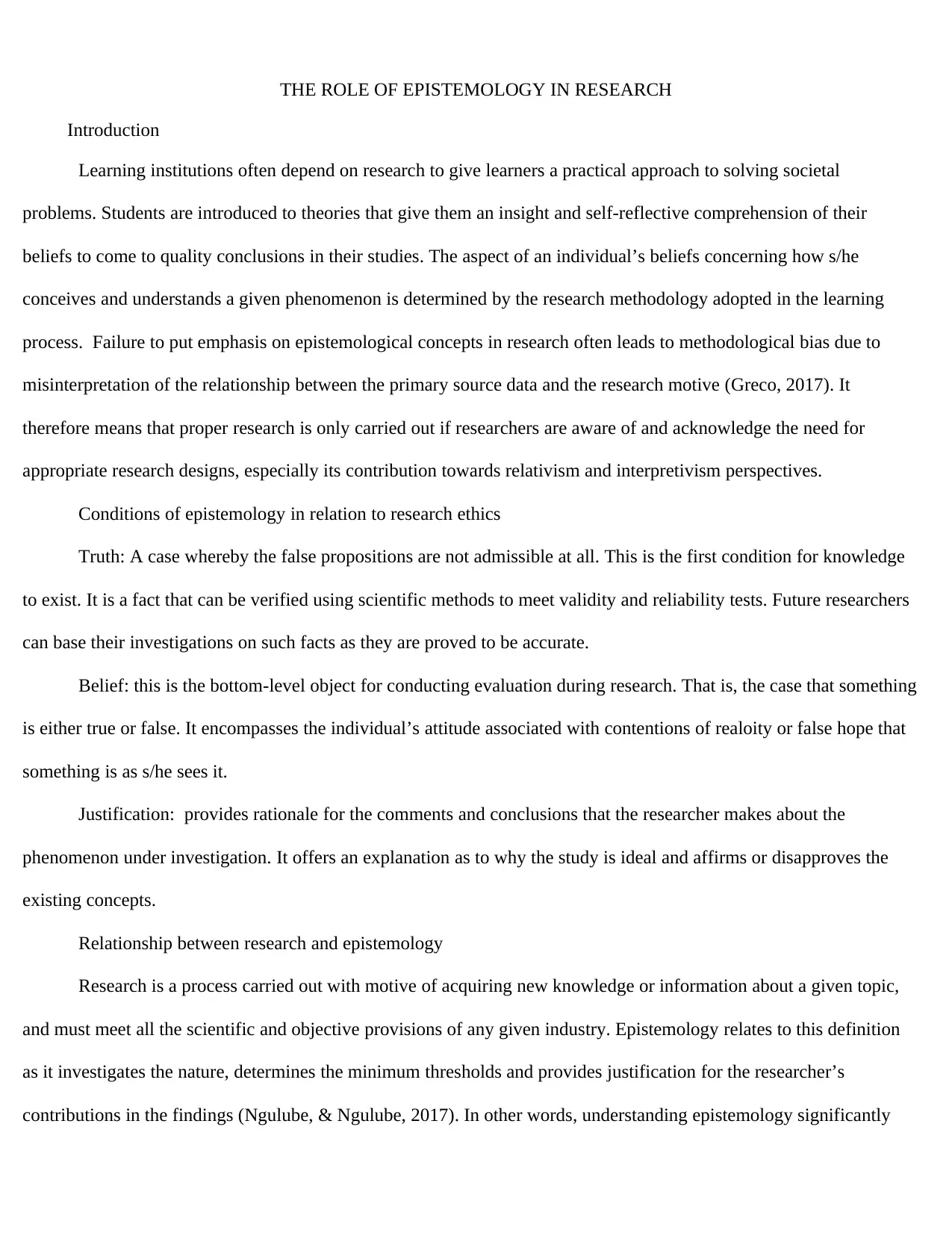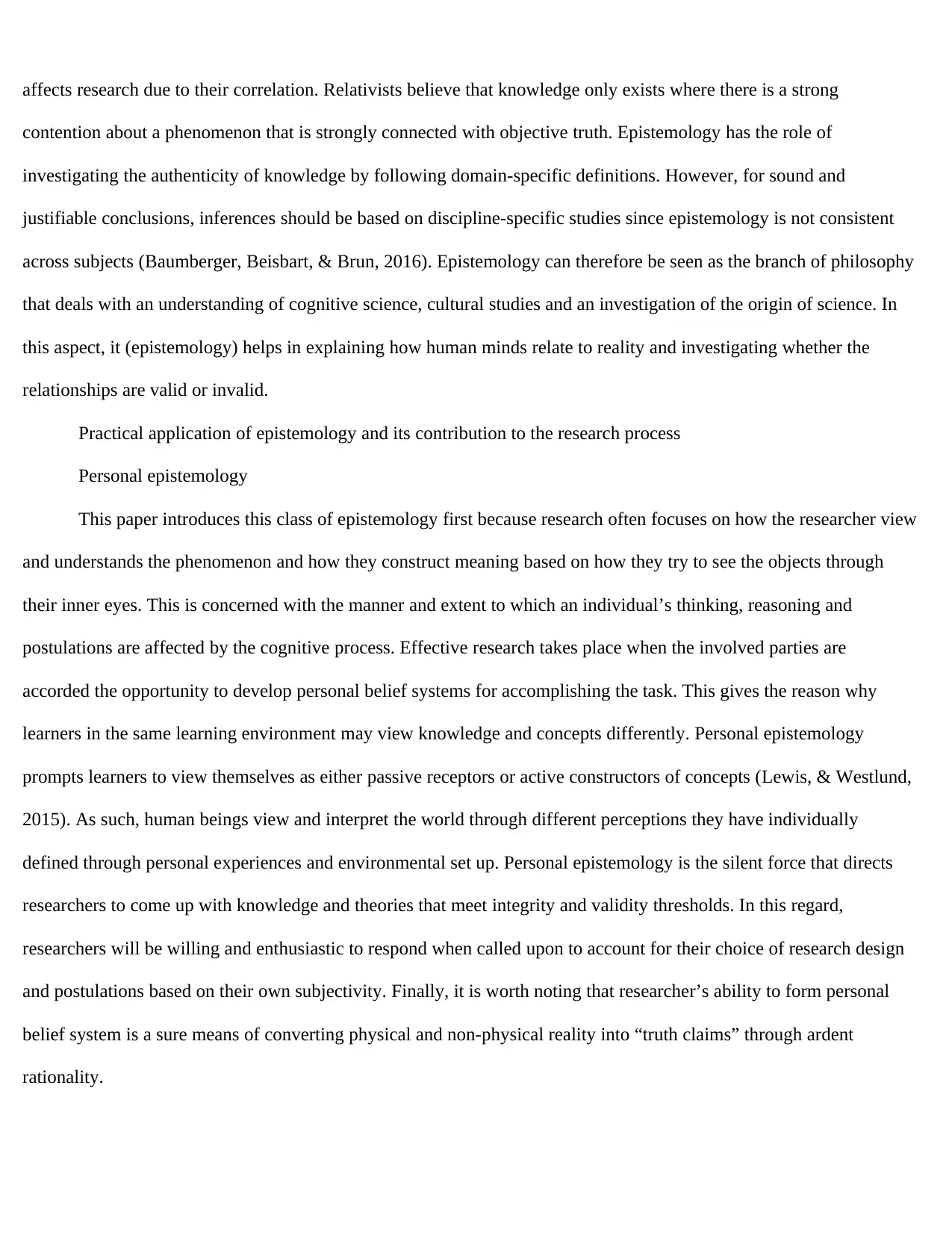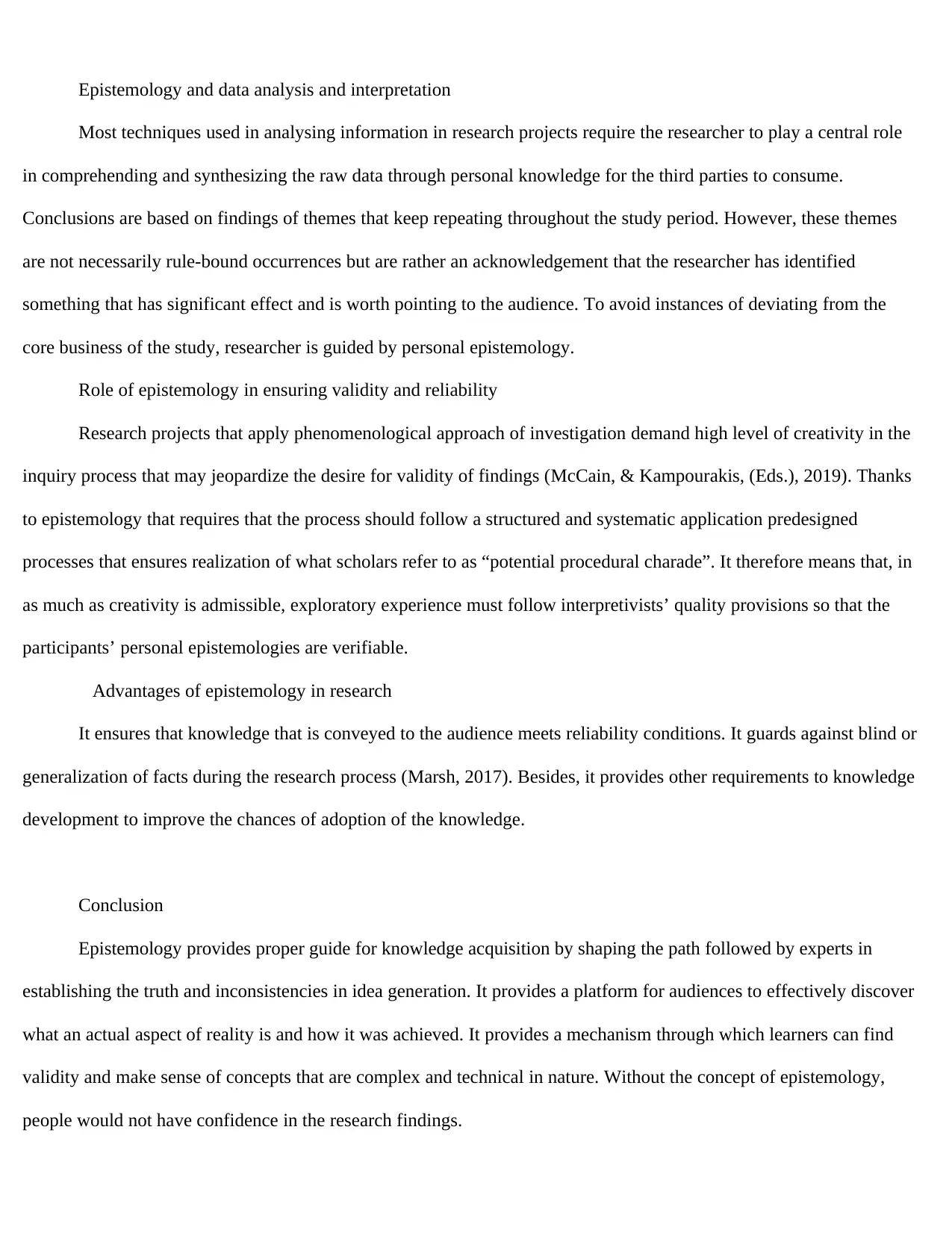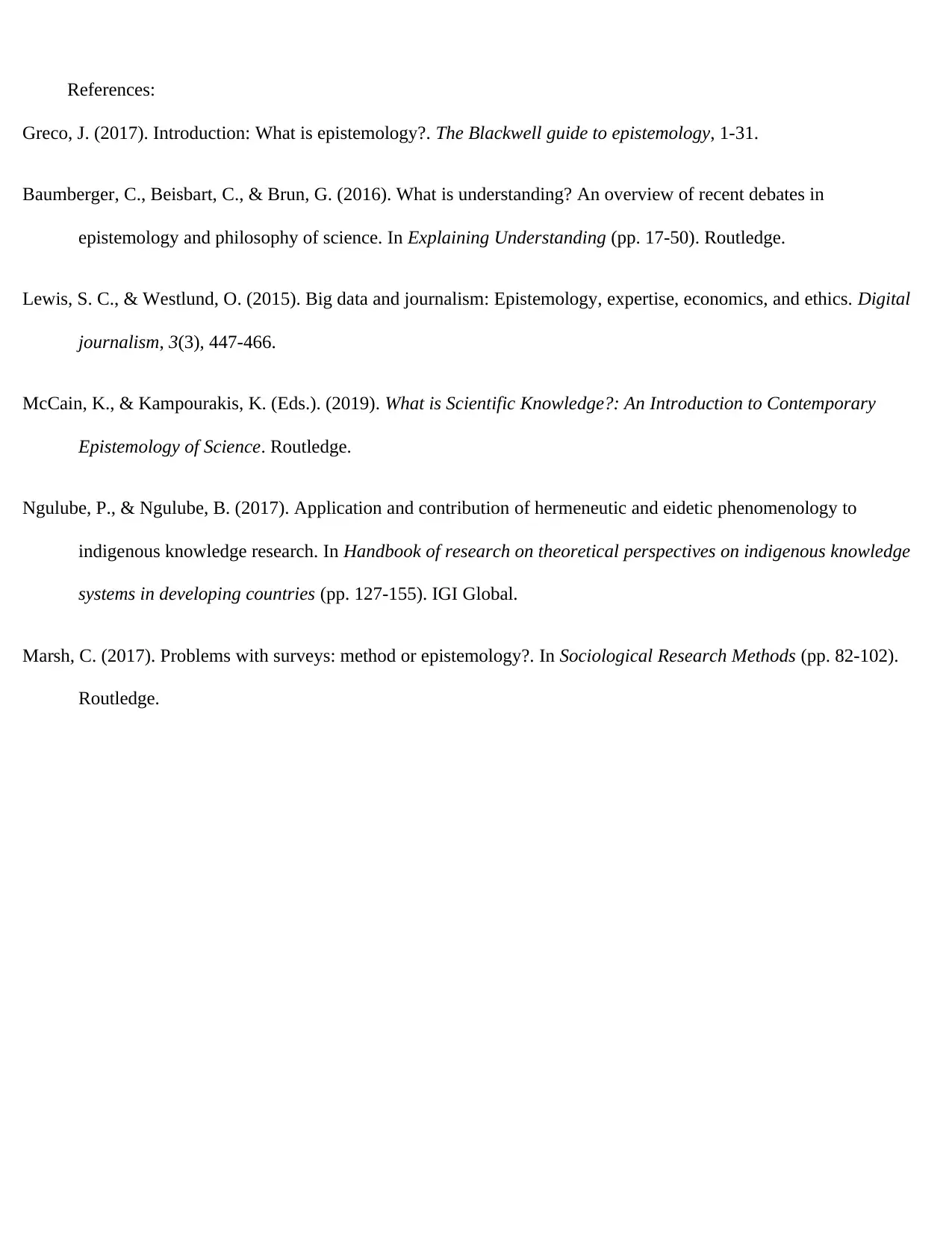Exploring the Role of Epistemology in Academic Research
VerifiedAdded on 2022/09/28
|4
|1350
|23
Essay
AI Summary
This essay provides a comprehensive overview of the role of epistemology in research, emphasizing its significance in shaping research methodologies and outcomes. The introduction establishes the importance of epistemology in guiding researchers toward sound conclusions and highlights the potential for methodological bias without a strong epistemological foundation. The essay defines key epistemological concepts such as truth, belief, and justification, and explores the relationship between research and epistemology, emphasizing the influence of personal beliefs on research design and data interpretation. It delves into the practical application of epistemology, particularly personal epistemology, and its impact on data analysis and ensuring validity and reliability in research projects. The essay further discusses the advantages of incorporating epistemology in research, such as enhancing the reliability of knowledge and preventing generalizations. The conclusion underscores the role of epistemology in guiding knowledge acquisition and providing a framework for understanding complex concepts within research. The essay references various academic sources to support its arguments and provides a strong understanding of epistemology.

THE ROLE OF EPISTEMOLOGY IN RESEARCH
Introduction
Learning institutions often depend on research to give learners a practical approach to solving societal
problems. Students are introduced to theories that give them an insight and self-reflective comprehension of their
beliefs to come to quality conclusions in their studies. The aspect of an individual’s beliefs concerning how s/he
conceives and understands a given phenomenon is determined by the research methodology adopted in the learning
process. Failure to put emphasis on epistemological concepts in research often leads to methodological bias due to
misinterpretation of the relationship between the primary source data and the research motive (Greco, 2017). It
therefore means that proper research is only carried out if researchers are aware of and acknowledge the need for
appropriate research designs, especially its contribution towards relativism and interpretivism perspectives.
Conditions of epistemology in relation to research ethics
Truth: A case whereby the false propositions are not admissible at all. This is the first condition for knowledge
to exist. It is a fact that can be verified using scientific methods to meet validity and reliability tests. Future researchers
can base their investigations on such facts as they are proved to be accurate.
Belief: this is the bottom-level object for conducting evaluation during research. That is, the case that something
is either true or false. It encompasses the individual’s attitude associated with contentions of realoity or false hope that
something is as s/he sees it.
Justification: provides rationale for the comments and conclusions that the researcher makes about the
phenomenon under investigation. It offers an explanation as to why the study is ideal and affirms or disapproves the
existing concepts.
Relationship between research and epistemology
Research is a process carried out with motive of acquiring new knowledge or information about a given topic,
and must meet all the scientific and objective provisions of any given industry. Epistemology relates to this definition
as it investigates the nature, determines the minimum thresholds and provides justification for the researcher’s
contributions in the findings (Ngulube, & Ngulube, 2017). In other words, understanding epistemology significantly
Introduction
Learning institutions often depend on research to give learners a practical approach to solving societal
problems. Students are introduced to theories that give them an insight and self-reflective comprehension of their
beliefs to come to quality conclusions in their studies. The aspect of an individual’s beliefs concerning how s/he
conceives and understands a given phenomenon is determined by the research methodology adopted in the learning
process. Failure to put emphasis on epistemological concepts in research often leads to methodological bias due to
misinterpretation of the relationship between the primary source data and the research motive (Greco, 2017). It
therefore means that proper research is only carried out if researchers are aware of and acknowledge the need for
appropriate research designs, especially its contribution towards relativism and interpretivism perspectives.
Conditions of epistemology in relation to research ethics
Truth: A case whereby the false propositions are not admissible at all. This is the first condition for knowledge
to exist. It is a fact that can be verified using scientific methods to meet validity and reliability tests. Future researchers
can base their investigations on such facts as they are proved to be accurate.
Belief: this is the bottom-level object for conducting evaluation during research. That is, the case that something
is either true or false. It encompasses the individual’s attitude associated with contentions of realoity or false hope that
something is as s/he sees it.
Justification: provides rationale for the comments and conclusions that the researcher makes about the
phenomenon under investigation. It offers an explanation as to why the study is ideal and affirms or disapproves the
existing concepts.
Relationship between research and epistemology
Research is a process carried out with motive of acquiring new knowledge or information about a given topic,
and must meet all the scientific and objective provisions of any given industry. Epistemology relates to this definition
as it investigates the nature, determines the minimum thresholds and provides justification for the researcher’s
contributions in the findings (Ngulube, & Ngulube, 2017). In other words, understanding epistemology significantly
Paraphrase This Document
Need a fresh take? Get an instant paraphrase of this document with our AI Paraphraser

affects research due to their correlation. Relativists believe that knowledge only exists where there is a strong
contention about a phenomenon that is strongly connected with objective truth. Epistemology has the role of
investigating the authenticity of knowledge by following domain-specific definitions. However, for sound and
justifiable conclusions, inferences should be based on discipline-specific studies since epistemology is not consistent
across subjects (Baumberger, Beisbart, & Brun, 2016). Epistemology can therefore be seen as the branch of philosophy
that deals with an understanding of cognitive science, cultural studies and an investigation of the origin of science. In
this aspect, it (epistemology) helps in explaining how human minds relate to reality and investigating whether the
relationships are valid or invalid.
Practical application of epistemology and its contribution to the research process
Personal epistemology
This paper introduces this class of epistemology first because research often focuses on how the researcher view
and understands the phenomenon and how they construct meaning based on how they try to see the objects through
their inner eyes. This is concerned with the manner and extent to which an individual’s thinking, reasoning and
postulations are affected by the cognitive process. Effective research takes place when the involved parties are
accorded the opportunity to develop personal belief systems for accomplishing the task. This gives the reason why
learners in the same learning environment may view knowledge and concepts differently. Personal epistemology
prompts learners to view themselves as either passive receptors or active constructors of concepts (Lewis, & Westlund,
2015). As such, human beings view and interpret the world through different perceptions they have individually
defined through personal experiences and environmental set up. Personal epistemology is the silent force that directs
researchers to come up with knowledge and theories that meet integrity and validity thresholds. In this regard,
researchers will be willing and enthusiastic to respond when called upon to account for their choice of research design
and postulations based on their own subjectivity. Finally, it is worth noting that researcher’s ability to form personal
belief system is a sure means of converting physical and non-physical reality into “truth claims” through ardent
rationality.
contention about a phenomenon that is strongly connected with objective truth. Epistemology has the role of
investigating the authenticity of knowledge by following domain-specific definitions. However, for sound and
justifiable conclusions, inferences should be based on discipline-specific studies since epistemology is not consistent
across subjects (Baumberger, Beisbart, & Brun, 2016). Epistemology can therefore be seen as the branch of philosophy
that deals with an understanding of cognitive science, cultural studies and an investigation of the origin of science. In
this aspect, it (epistemology) helps in explaining how human minds relate to reality and investigating whether the
relationships are valid or invalid.
Practical application of epistemology and its contribution to the research process
Personal epistemology
This paper introduces this class of epistemology first because research often focuses on how the researcher view
and understands the phenomenon and how they construct meaning based on how they try to see the objects through
their inner eyes. This is concerned with the manner and extent to which an individual’s thinking, reasoning and
postulations are affected by the cognitive process. Effective research takes place when the involved parties are
accorded the opportunity to develop personal belief systems for accomplishing the task. This gives the reason why
learners in the same learning environment may view knowledge and concepts differently. Personal epistemology
prompts learners to view themselves as either passive receptors or active constructors of concepts (Lewis, & Westlund,
2015). As such, human beings view and interpret the world through different perceptions they have individually
defined through personal experiences and environmental set up. Personal epistemology is the silent force that directs
researchers to come up with knowledge and theories that meet integrity and validity thresholds. In this regard,
researchers will be willing and enthusiastic to respond when called upon to account for their choice of research design
and postulations based on their own subjectivity. Finally, it is worth noting that researcher’s ability to form personal
belief system is a sure means of converting physical and non-physical reality into “truth claims” through ardent
rationality.

Epistemology and data analysis and interpretation
Most techniques used in analysing information in research projects require the researcher to play a central role
in comprehending and synthesizing the raw data through personal knowledge for the third parties to consume.
Conclusions are based on findings of themes that keep repeating throughout the study period. However, these themes
are not necessarily rule-bound occurrences but are rather an acknowledgement that the researcher has identified
something that has significant effect and is worth pointing to the audience. To avoid instances of deviating from the
core business of the study, researcher is guided by personal epistemology.
Role of epistemology in ensuring validity and reliability
Research projects that apply phenomenological approach of investigation demand high level of creativity in the
inquiry process that may jeopardize the desire for validity of findings (McCain, & Kampourakis, (Eds.), 2019). Thanks
to epistemology that requires that the process should follow a structured and systematic application predesigned
processes that ensures realization of what scholars refer to as “potential procedural charade”. It therefore means that, in
as much as creativity is admissible, exploratory experience must follow interpretivists’ quality provisions so that the
participants’ personal epistemologies are verifiable.
Advantages of epistemology in research
It ensures that knowledge that is conveyed to the audience meets reliability conditions. It guards against blind or
generalization of facts during the research process (Marsh, 2017). Besides, it provides other requirements to knowledge
development to improve the chances of adoption of the knowledge.
Conclusion
Epistemology provides proper guide for knowledge acquisition by shaping the path followed by experts in
establishing the truth and inconsistencies in idea generation. It provides a platform for audiences to effectively discover
what an actual aspect of reality is and how it was achieved. It provides a mechanism through which learners can find
validity and make sense of concepts that are complex and technical in nature. Without the concept of epistemology,
people would not have confidence in the research findings.
Most techniques used in analysing information in research projects require the researcher to play a central role
in comprehending and synthesizing the raw data through personal knowledge for the third parties to consume.
Conclusions are based on findings of themes that keep repeating throughout the study period. However, these themes
are not necessarily rule-bound occurrences but are rather an acknowledgement that the researcher has identified
something that has significant effect and is worth pointing to the audience. To avoid instances of deviating from the
core business of the study, researcher is guided by personal epistemology.
Role of epistemology in ensuring validity and reliability
Research projects that apply phenomenological approach of investigation demand high level of creativity in the
inquiry process that may jeopardize the desire for validity of findings (McCain, & Kampourakis, (Eds.), 2019). Thanks
to epistemology that requires that the process should follow a structured and systematic application predesigned
processes that ensures realization of what scholars refer to as “potential procedural charade”. It therefore means that, in
as much as creativity is admissible, exploratory experience must follow interpretivists’ quality provisions so that the
participants’ personal epistemologies are verifiable.
Advantages of epistemology in research
It ensures that knowledge that is conveyed to the audience meets reliability conditions. It guards against blind or
generalization of facts during the research process (Marsh, 2017). Besides, it provides other requirements to knowledge
development to improve the chances of adoption of the knowledge.
Conclusion
Epistemology provides proper guide for knowledge acquisition by shaping the path followed by experts in
establishing the truth and inconsistencies in idea generation. It provides a platform for audiences to effectively discover
what an actual aspect of reality is and how it was achieved. It provides a mechanism through which learners can find
validity and make sense of concepts that are complex and technical in nature. Without the concept of epistemology,
people would not have confidence in the research findings.
⊘ This is a preview!⊘
Do you want full access?
Subscribe today to unlock all pages.

Trusted by 1+ million students worldwide

References:
Greco, J. (2017). Introduction: What is epistemology?. The Blackwell guide to epistemology, 1-31.
Baumberger, C., Beisbart, C., & Brun, G. (2016). What is understanding? An overview of recent debates in
epistemology and philosophy of science. In Explaining Understanding (pp. 17-50). Routledge.
Lewis, S. C., & Westlund, O. (2015). Big data and journalism: Epistemology, expertise, economics, and ethics. Digital
journalism, 3(3), 447-466.
McCain, K., & Kampourakis, K. (Eds.). (2019). What is Scientific Knowledge?: An Introduction to Contemporary
Epistemology of Science. Routledge.
Ngulube, P., & Ngulube, B. (2017). Application and contribution of hermeneutic and eidetic phenomenology to
indigenous knowledge research. In Handbook of research on theoretical perspectives on indigenous knowledge
systems in developing countries (pp. 127-155). IGI Global.
Marsh, C. (2017). Problems with surveys: method or epistemology?. In Sociological Research Methods (pp. 82-102).
Routledge.
Greco, J. (2017). Introduction: What is epistemology?. The Blackwell guide to epistemology, 1-31.
Baumberger, C., Beisbart, C., & Brun, G. (2016). What is understanding? An overview of recent debates in
epistemology and philosophy of science. In Explaining Understanding (pp. 17-50). Routledge.
Lewis, S. C., & Westlund, O. (2015). Big data and journalism: Epistemology, expertise, economics, and ethics. Digital
journalism, 3(3), 447-466.
McCain, K., & Kampourakis, K. (Eds.). (2019). What is Scientific Knowledge?: An Introduction to Contemporary
Epistemology of Science. Routledge.
Ngulube, P., & Ngulube, B. (2017). Application and contribution of hermeneutic and eidetic phenomenology to
indigenous knowledge research. In Handbook of research on theoretical perspectives on indigenous knowledge
systems in developing countries (pp. 127-155). IGI Global.
Marsh, C. (2017). Problems with surveys: method or epistemology?. In Sociological Research Methods (pp. 82-102).
Routledge.
1 out of 4
Related Documents
Your All-in-One AI-Powered Toolkit for Academic Success.
+13062052269
info@desklib.com
Available 24*7 on WhatsApp / Email
![[object Object]](/_next/static/media/star-bottom.7253800d.svg)
Unlock your academic potential
Copyright © 2020–2026 A2Z Services. All Rights Reserved. Developed and managed by ZUCOL.





